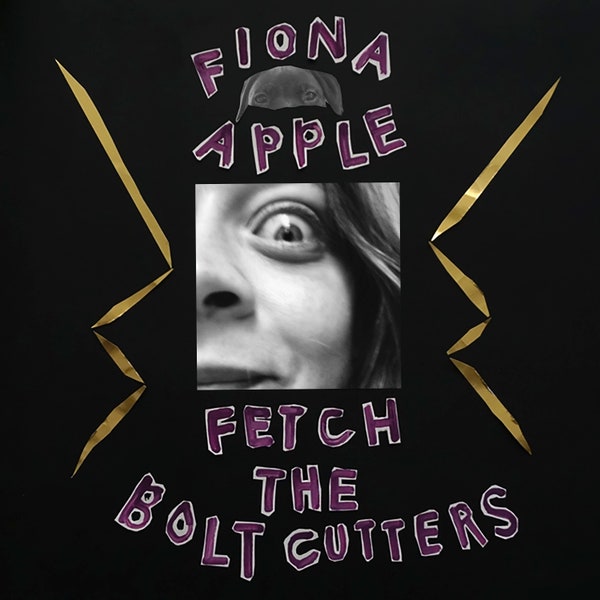Fiona Apple reflects on her past in intense and emotional new album “Fetch the Bolt Cutters”

Epic Records
May 28, 2020
On Friday, April 17, singer song-writer and pianist Fiona Apple released her emotional and intense fifth studio album “Fetch the Bolt Cutters” after eight years.
The album begins with a funky and disorienting beat that swiftly proceeds into a progression of beautiful piano chords in “I Want You To Love Me,” with Apple’s melodic voice arriving shortly after. The optimistic piano chords continue into the chorus of the song, where the desperation in Apple’s voice is clearly heard in the way she drags out each word as if it has no end. Her angelic-like voice transforms into an angrier one, where she voices “And while I’m in this body / I want somebody to want.” This track brings out the rawness and emotion in Apple’s voice. The way in which she shifts from anguish to rage is the highlight of this track and leaves listeners on edge. The final moments of the song include Apple going into her falsetto, once again soft, until her voice fades into a chilling whisper.
Then begins her next track, “Shameika,” with a groovy instrumentation of the piano and Apple’s voice far more confident in comparison to “I Want You To Love Me”. In an almost conversational manner, Apple addresses the title of the track, claiming “Shameika said I had potential,” which touches on her difficulty in forming relationships in middle school. After being laughed at by her peers at the age of 11, Apple remembers a girl named Shameika asking why she even tried to talk to those girls in the first place when she had potential, or that she could do better. This resonated deeply with Apple because at the time, she claims her relationship with women started to falter. It gave her a newfound confidence to not give in to the bullies. The track continues with the beat of the drum and the assuring complex chords of the piano. The song has a hint of youthfulness to it and Apple’s piano playing skills allow her to convey the multi-layered emotions she feels that spurred from her middle school days.
Title track “Fetch the Bolt Cutters” starts off almost what one would imagine fetching bolt cutters would sound like: clunky and uncomfortable. The ten second intro is abruptly replaced by Apple’s voice, however, the discombobulated instrumentation in the background is still noticeable. As the chorus approaches, Apple’s voice almost transforms into an echoey sound, where her voice is overlapped with her own in harmony. The second voice that comes in repeats the same lyrics, just a little delayed and it almost adds a humanistic and vulnerable element to the song, not to mention the snippets of dogs barking in the background as well.
The following track “Under The Table” is definitely an album favorite due to Apple’s beautiful falsetto that is highlighted through this song. However, the song soon transforms into a fiery, passionate and playful one where Apple says to “Kick me under the table all you want / I won’t shut up / I won’t shut up,” the strong beat of the drum adding to the message. The song was inspired by a time when Apple attended an expensive dinner party and overheard someone making offensive remarks. She knew it wouldn’t be considered appropriate to call the man out at that moment, but she did so anyways, hence the impassioned tone in the song. Her next song “Relay” also has a similar tone, with the strong beat of the drums, a multidimensional voice that is almost yelling speaks to the anger she has within. The song finishes in a more jazzy manner that quiets into Fiona’s signature high pitched falsetto.
As the album continues into its latter half, “Rack of His” takes a more gentle and “Willy Wonka and the Chocolate Factory” turn in its obscurity and youthfulness. Her voice is far more raspy and often enters a conversational tone, similar to “Shameika.” Apple stated she had been working on this song for ten years, and is actually focused on two different relationships. Apple claims that often times she “didn’t know enough” to add to the song and had to wait until she “knew enough” in order to finish it.
Another album favorite that speaks to the relationship between women is “Ladies,” a jazz inspired tune. The bass of the guitar along with Apple’s perfectly balanced voice escalates into a more empowering message when the raspiness of her voice emerges as she sings “Ladies, ladies, ladies, ladies, take it easy.” The somber strum of the guitar and the semi-melancholy chords of the piano speaks to the fact that Apple is simply trying to get her message across without coming off too strong. Through the snippets of her gentle humming and the toe-tapping rhythm of the song, this is easily one of the best tracks off the album. Fiona states “this album is not letting men pit us against each other or keep us separate … so they can control the message.”
However, the soft side of Apple only starts for “Ladies” as she segways into “Heavy Balloon,” a very fierce display of emotions by Apple. Through the banging of the drums and sinister voice of Apple, she sings “You get dragged down / down to the same spot enough times in a row / The bottom begins to feel like the only safe place that you know.” This dark message is Apple’s ode to the weight of depression, as she describes it as getting “Stockholm syndrome with your own depression — like you’re kidnapped with your own depression.”
The album almost comes to a close with mysterious and mystical track “Drumset,” which begins with an almost fairy-tale like introduction. The drum soon takes on a pleasant rhythm that is easy to follow along. Apple’s voice range is especially seen in this song, as she drifts from not only high to low pitches, but also from soft to passionate in an instant. The chorus is quite catchy, as Apple’s voice matches the beat of the drums perfectly, a slight laughter in her voice in the last few words of the song. Apple claims the song originated over a dispute between her and the band, in which they both misinterpreted the situation. While sitting alone pondering over the situation, she began to sing how she felt into the phone, an act she did often in her childhood. In fact, the lyrics present in the song are unchanged from this version. When Apple recorded the song in one take, the band and her had a laughing moment, which was then kept in the song.
The journey soon finishes with her final song “On I Go,” a sentiment to that fact that “there doesn’t have to be any specific meaning or reward or consequence of the things I’m doing. I do them because I enjoy doing them,” as she states upon reflecting over the song. The song starts off with the shake of maracas and the strong beat of a drum, almost as if an army of feet are stomping on bleachers. Apple begins to sing in harmony, ultimately leading to a tribal-like chorus. Her voice is almost warped and tuned out, but suddenly kicks into full gear while she sings the repeated lyrics “On I go, not toward or away / Up until now it was day, next day.” Apple fully believes in staying in the moment and moving solely for the purpose of moving. Everything is happening in the present and she feels like she doesn’t have to prove anything to anyone anymore, simply because she enjoys what she is doing and that is all that matters. Apple’s confidence in these beliefs is evidence in the very confidence pouring through the song itself. There seems to be no weakness or faltering in her voice, only emphasizing the message she aims to send listeners. The song and album ends on an abrupt note, leaving us wanting even more.
After eight long years, Apple did not disappoint with the experimental and passionate “Fetch the Bolt Cutters,” successfully proving that she has transformed and progressed as a musician more than ever before. The wisdom she shares through every meaningful song, empowering women to stand up for each other, along with the humanistic element to her album through experimental sounds and snippets of laughter add a new dimension to her album that truly makes it unique and one-of-a-kind.




